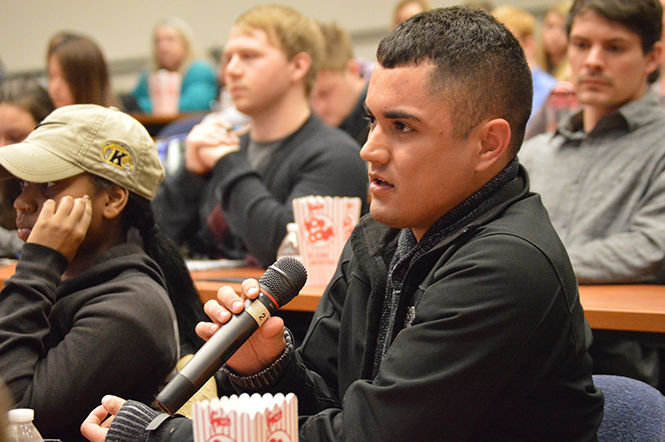“Media at the Movies’ event discusses morality, trust
Angelo Angel, a sophomore magazine journalism major, answers Thor Wasbotten’s question of why he wants to go into journalism. “A sense of adventure, honestly,” said Angel. The school of Journalism and Mass Communication hosted “Media at the Movies” and showed “A Fragile Trust: Plagiarism, Power and Jayson Blair at the New York Times” in the First Energy Auditorium on Tuesday, March 10, 2015.
March 11, 2015
A guest panel discussed morality and how journalists should know whether their actions are legal to a group of students and faculty at “Media at the Movies” presented by The School of Journalism and Mass Communication.
The school showed, “A Fragile Trust: Plagiarism, Power and Jayson Blair at the New York Times,” Tuesday evening in Franklin Hall’s First Energy Auditorium. The 2014 documentary told the story of former New York Times columnist Jayson Blair and his actions of plagiarism and fabrication that led to termination of his career and credibility.
The event was a way for the School of Journalism and Mass Communication to expand its ethics program, said Jan Leach, associate professor in the School of Journalism and Mass Communication.
“I wanted to extend our ethics footprint so students do not forget about ethics the whole rest of the year,” Leach said. “I thought it would a cool way to talk about journalism ethics and media ethics by doing it through a movie.”
The panelist for the event shared their thoughts on the movie and how ethics play a role in everyday life.
“I think most people are governing not by how easy it is to get away with stuff, but by a sense of right and wrong,” said panelist Jim Crutchfield, former publisher of the Akron Beacon Journal and current member of the Board of Trustees of the Knight Foundation. “A sense of ‘I can’t cheat.’ I think most of us are good people. I come away thinking Jayson Blair is not a very good person.”
Crutchfield explained if journalists allow people to not believe in their work, then, “there is no point in what we do.”
“If the journalist trust is gone, those of you going into public relations and advertising, do not stand much of a chance,” Crutchfield said. “You need trust.”
When it comes to the media and journalist, Crutchfield said there is a fragile trust with the public. She further explained that when events such as Jayson Blair’s instances occur, that trust is broken, and credibility for all journalist is questioned.
Thor Wasbotten, director of JMC and a panelist, said there is competition amongst journalist to get the truth out.
“There’s so much competition, and it can put a lot of pressure on people,” Wabotten said. “At the same time, that is that equity that we built with our community. As soon as you jeopardize that trust, jeopardize that equity, it’s a real risk that you could damage that at any time.”
David LaBelle, lecturer in the School of Journalism and Mass Communication, said the pressure to cheat is real.
“In the real world, the pressure is very real to cheat to achieve positions of power like Blair did,” LaBelle said.
In “A Fragile Trust,” Blair said his actions of plagiarising and fabricating were a result of bipolar disorder.
However, panelist Brian Welsh, chief medical officer at Coleman Professional Services in Kent and mental health psychiatrist, said a mental illness in not an excuse for the actions Blair took.
“They may have a mental illness, but they still know what they are doing is wrong,” Welsh said. “The mental illness is often independent. In itself it’s not making choices.”
In the world of ethics, journalists have to ask if the person in the wrong could have done otherwise — by actually researching and interviewing, said panelist Deborah Barnbaum, chair of the Department of Philosophy and an ethicist. One of the definitions of moral responsibility is if a person is free to make other choices, she said.
“In order to autonomous, an individual has to be able to engage in intentional actions,” Barnbaum said. “It has to be free, and it has to be what they want to have done. They have to have enough information to make a rational choice.”
Blair was not able to make a rational choice, Barnbaum said. He had set goals for himself, but acted irrationally to achieve those goals.
“If you do not run the risk of being caught, then the question is what is going to stop you at all,” Barnbaum said. “People need to realize if you do not do something because you think you will get caught, then you might as well be a child.”
Contact Jessica Darling at [email protected].

















